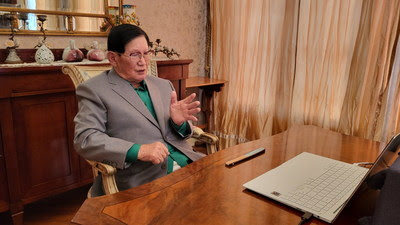The company’s recently launched transformers for floating applications are the first entry into the OceaniQ™ portfolio of solutions that address the unique challenges of the offshore environment
Zurich, Switzerland, April 04, 2022 (GLOBE NEWSWIRE) — Hitachi Energy today launched its OceaniQ™ portfolio(*1) for the offshore energy environment, which will be showcased this week at the annual WindEurope event in Bilbao, Spain. The global technology and market leader in power grids, which has a proven track record(*2) in pioneering solutions for offshore, has created OceaniQ to help accelerate the clean energy transition. OceaniQ will result in greater volumes of wind power being efficiently harvested and integrated into the world’s energy system.
Combining cross-industry competence from the power and marine sectors, OceaniQ addresses applications for fixed platforms, floating structures and sub-sea power systems for wind, marine and other offshore operators. Hitachi Energy rigorously designs its OceaniQ products, services and solutions in collaboration with customers and partners, which are designed to solve the specific needs of offshore energy operators.
Key characteristics of OceaniQ solutions feature a modular design to enable timely installation and the ability to quickly connect energy assets to onshore. OceaniQ solutions take advantage of digitalization, enabling safe and secure remote monitoring and other services such as predictive maintenance. Designs are also ruggedized to withstand harsh marine conditions, minimizing the need for physical service over their lifetime. OceaniQ solutions also embody the rigorous application of lifecycle thinking.
OceaniQ™ transformers for offshore floating applications
The first products to be announced as part of the OceaniQ portfolio are Hitachi Energy’s recently announced transformers for offshore floating applications. Since the first commercial projects in the early 1990s, offshore wind electricity generation has grown enormously, with more than 35 gigawatts(*3) capacity currently worldwide. Yet building offshore brings great challenges beyond the harsh salt-water environment and only a small fraction of the full potential has been exploited. This is because many offshore areas do not have a suitable seabed and beyond 60-meter depths are not optimal for fixed structures.
OceaniQ™ transformers and shunt reactors are key equipment in the grid infrastructure that enables the transmission of electricity generated in offshore wind farms. This full and qualified range of equipment has been developed in partnership with the forefront floating offshore developers. It brings in world-leading experience to meet requirements, featuring a lightweight, compact and modular design that comprises of specially-designed transformer active part, tank and components.
“In OceaniQ, our world-class engineers take pride in pioneering solutions that overcome harsh offshore conditions and ultimately, help society move towards a carbon-neutral future,” said Bruno Melles, Managing Director of Hitachi Energy’s Transformers business. Bruno added, “Floating electrical systems are an important development in the evolution of the offshore renewable industry that will open up tremendous opportunities and unlock new business models that are built on clean power. OceaniQ is fully in the spirit of Hitachi Energy’s Purpose, which is focused on advancing a sustainable energy future for all.”
Alfredo Parres(*4), Head of Renewables at Hitachi Energy commented, “Wind power is one of Earth’s bountiful and free-giving natural resources and through the OceaniQ offshore portfolio, customers will be able to harness and integrate it more efficiently. Alfredo continued, “Through OceaniQ, we are building a more sustainable, flexible and secure energy system by bringing together our experts in offshore applications and wind farm connections to develop and build the solutions needed for a more integrated, interconnected and high-quality power grid. I am excited to be discussing OceaniQ with customers at WindEurope this week and how together, we can continue to pioneer technologies that maximize the full potential of offshore wind.”
This latest portfolio development from Hitachi Energy continues to demonstrate the company’s commitment to pushing the boundaries of innovation for sustainable offshore energy environment solutions, adding to an already extensive offering. The company expects to announce new additions to the OceaniQ portfolio in the coming months. The launch of OceaniQ follows the company’s recent launches of IdentiQ™ – its digital twin solutions for HVDC and power quality – and EconiQ™ – its portfolio of solutions which are proven to deliver an exceptional environmental performance resulting in significant reductions in carbon footprint.
Notes
(*1) Read more about OceaniQ: https://www.hitachienergy.com/
(*2) Three examples of Hitachi Energy’s proven track record in offshore wind:-
- Dogger Bank – connecting the world’s largest offshore wind farm (located off the North East coast of England, UK)
- WindSTAR transformers for offshore wind turbines for major renewable projects in Taiwan
- First-of-its-kind High-voltage hybrid switchgear for offshore wind enabling the reduction of carbon emissions
(*3) Global Wind Energy Council’s Global Offshore Wind Report 2021
(*4) Read one of Alfredo Parres’ Perspectives on offshore wind: Offshore synergy – combining oil & gas experience with grid technology leadership for sustainable energy | Hitachi Energy
Attachment
Rebecca Bleasdale Hitachi Energy Ltd. +41 78643 2613 rebecca.bleasdale@hitachienergy.com

